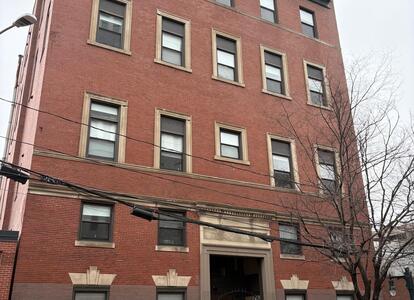Jewish Community Center
BackJewish Community Center
341 Cumberland Ave
Travel down High and turn right onto Cumberland Ave., and you will reach 341 Cumberland, a five-story apartment building on the left.
For more than forty years (1938-1979), this building was home to the Jewish Community Center (JCC). A Jewish community center had operated on Wilmot Street from 1925, principally as a meeting hall. However, the JCC established at this address was a formal organization with a board of directors and elected officers. And it provided—for the first time in history—a secular focal point for the varied activities of Portland Jewry.
The JCC was not a casual creation by Portland Jews. Rather, it was a robust community solution to two major threats. The first was internal—as synagogues ceased to meet the needs of a new generation who were becoming more Americanized, the Jewish community feared it would lose its institutional focal point. The second threat was external—as Jews were boxed out of local society, politics, and the economy by redlining policies in real estate and discrimination from clubs, hotels, and resorts (see Stop D01), there was real concern that Jews would be excluded from American society.
The new JCC presented an attractive secular, institutional alternative to meet a variety of social needs. It designed programming that provided Jews with a better understanding of the Jewish people, and an awareness of their duty to their people, to America and American democracy, and the importance of participation in their communities. In her undergraduate thesis, Julia Lipez, now a Maine judge, noted that the JCC provided a vigorous and confident internal and public identity that was American and Jewish.
The JCC’s first executive director, and by all accounts a generational leader, was Norman Godfrey. Recruited from the JCC in Stamford, Connecticut in 1938, Godfrey was laser focused on community-building. His vision, articulated at the JCC’s opening, was that it should realize the spirit of the Jewish people, to “bring light, truth and justice to all mankind…with noble purpose of perpetuating and developing Jewish life upon the highest plane, in consonance with the traditions and ideals of the founding fathers of our great democracy, the JCC now enters on its course of service devoted to the enrichment of the individual personality and enhancement of the group life of American Jewry.” In this context, the first impressions of a young Phil Levinsky make sense: “You felt at home the moment you stepped in. It was wonderful.”
The new JCC was a success! Here, at last, was a secular American Jewish institution that offered a wide range of facilities and programs designed to help young men and women feel Jewish in a setting that allowed for physical recreation, social relationships, cultural activities and meetings of Jewish clubs and associations. Within walking distance from Portland’s Jewish neighborhoods, it was in an ideal location. And equipped with a gymnasium, bowling alley, theater, 300-seat auditorium, and numerous meeting rooms for social and cultural functions, it was a true multipurpose space.
The secular programs had another long-term benefit: they created a new generation of leaders of Portland civic life. Many of the young Jews who received leadership training at the JCC credited it with their success later in professional, civic and cultural life. Lenny Nelson, for example, attributes his ability to lead the Portland Symphony Orchestra at age 23 to the training he received as president of the Center Youth at the JCC (see Stop D06).
For about 30 years, the JCC was enormously popular. In 1967, near its peak, it had 654 household members. But as Jewish families moved to the suburbs, membership began to dwindle, falling to 339 households by 1982. The building on Cumberland was sold in 1979 and the JCC moved off the peninsula to Ashmont Street, and subsequently to its present location on outer Congress Street (Stop W10). Now combined with the Jewish Federation and Jewish Family Services to form the Jewish Community Alliance, the community center is thriving once again, and reaching out to communities in need in Greater Portland and Southern Maine.

